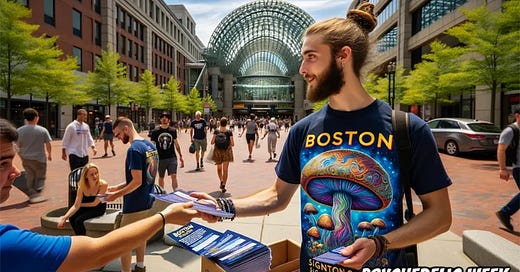Is Massachusetts Psychedelic Ballot Campaign in Trouble?
Sources say New Approach-backed campaign may be scrambling to collect new signatures after alleged error involving first 75,000 collected
*Updated December 27, 2023.
Today, multiple sources say the Massachusetts psychedelic ballot campaign run by New Approach PAC may have made technical errors while collecting signatures for its 2024 ballot initiative.
To keep the ballot initiative alive, proponents must file 74,574 signatures with election officials before November 22, one week from today (update: according to the campaign, it has collected over 100,000 signatures before the deadline).
Rumor has it the campaign must start from scratch and collect an additional 74,574 signatures. So far, Psychedelic Week has been unable to verify these claims, which should not be taken as fact until they can be confirmed. (update: according to Boston’s WBUR, “state officials [who reviewed the campaign’s signatures] found several "disqualifying marks" on their ballot papers,” and “the campaign printed a labor union logo on their ballot sheets, violating signature-gathering regulations and potentially invalidating thousands of signatures.”
Psychedelic Week contacted New Approach’s Jared Moffat, who oversees the Massachusetts campaign, but did not receive a response before press time. Moffat later offered to send a campaign statement (see below), but he declined to comment on the alleged errors in signature collection or reporting.
At 12:34 pm Eastern, author Jules Evans posted on X (formerly Twitter), “I hear that New Approach PAC collected the necessary 75,000 signatures for the Massachusetts psychedelic therapy bill, but there's been some error so they have to collect them all again with a week or so to go, hence they're hiring signature gatherers...?”
Evans linked to a job post for campaign signature gatherers, which other sources independently provided to Psychedelic Week.
The posting states, “We’re urgently hiring campaign staff to gather petition signatures from Massachusetts voters to put an important initiative on the ballot in 2024!” and “We are hiring folks to start ASAP and this is a short-term role, with an end date of 11/19.” Instead of paying signature gatherers per signature, which is commonly done to incentivize them, the campaign is offering an hourly wage.
A spokesperson for the campaign declined to tell WBUR how many signatures were affected or comment on the union logo that reportedly appeared on the signature forms. Prior to the revelation that disqualifying marks appeared on the paperwork, the conspiratorially-minded might have wondered whether these rumors could serve as pretext for the campaign to substitute a different version of its ballot initiative.
On September 6, Massachusetts Attorney General Andrea Campbell certified two psychedelic voter ballot petitions submitted by the campaign: 23-13 (Version A) and 23-14 (Version B). Certification means that according to Campbell, the petitions meet the state’s constitutional requirements, and proponents can start collecting signatures.
Petitions Versions A and B are nearly identical. Both would create a regulated program for the non-medical, supported adult use of five psychedelic substances: psilocybin, psilocin, ibogaine, mescaline, and dimethyltryptamine. The petitions have only one difference. Version A would allow people to legally cultivate psychedelics at home, and Petition Version B would not.
After a backlash from local activists who support home cultivation, including Bay Staters for Natural Medicine and New England Veterans for Plant Medicine, New Approach agreed to pursue only Version A, which would allow home cultivation. However, Psychedelic Week has been unable to verify that the 74,574 previously collected were for Version A, and it isn’t clear whether new signatures will be collected for Version A or B.
Within hours of this article’s publication, the public relations firm Dewey Square Group sent a message from the campaign stating, “we are working diligently to ensure we meet the signature threshold to move our petition (Version A) forward in the ballot qualification process.”
It is unclear whether collecting the required signatures within one week is a realistic goal, especially with the Thanksgiving holiday rapidly approaching. However, the campaign statement was optimistic. “We are confident we will have a sufficient number of signatures to qualify.” The statement omitted mention of the alleged signature collection or reporting errors and did not explain why additional signature collection may be necessary.
Stay tuned to Psychedelic Week for further coverage of the Massachusetts campaign and efforts by local activists like Bay Staters to enact psychedelic legislation with state lawmakers.
*The views expressed on Psychedelic Week do not represent the views of Harvard University, POPLAR at the Petrie-Flom Center at Harvard Law School, Florida State University, or the Florida State University College of Law. Psychedelic Week is an independent project unaffiliated with these and other programs and institutions.
Mason Marks, MD, JD is a Visiting Professor of Law at Harvard Law School. He is also the Florida Bar Health Law Section Professor at Florida State University, senior fellow and project lead of the Project on Psychedelics Law and Regulation (POPLAR) at the Petrie-Flom Center at Harvard Law School, and an visiting fellow at the Information Society Project at Yale Law School. Marks teaches drug law, psychedelic law, constitutional law, and administrative law. Before moving to Florida, he served on the Oregon Psilocybin Advisory Board where he chaired its Licensing Subcommittee. Marks has drafted drug policies for state and local lawmakers. His forthcoming book on psychedelic law and politics will be published by Yale University Press. He tweets at @MasonMarksMD and @PsychedelicWeek.





